Thomas Cook: Leadership, Management, and Service Industry Analysis
VerifiedAdded on 2021/01/02
|14
|4909
|161
Report
AI Summary
This report delves into the realms of leadership and management within the service industry, focusing on the application of classical management theories, the roles of leaders, and diverse leadership styles. It examines how companies like Thomas Cook utilize these principles to enhance customer satisfaction, improve operational efficiency, and gain competitive advantages. The report explores the impact of internal and external factors on management styles, the importance of hard and soft skills, and the evolving landscape of management and leadership skills required for the future. Furthermore, it compares different service industry organizations and evaluates change management and leadership strategies. The analysis covers Weber and Taylor's theories, autocratic, democratic, and participative leadership styles, and their practical implications in the service sector, offering insights into how these elements contribute to organizational success and adaptation in a dynamic business environment.
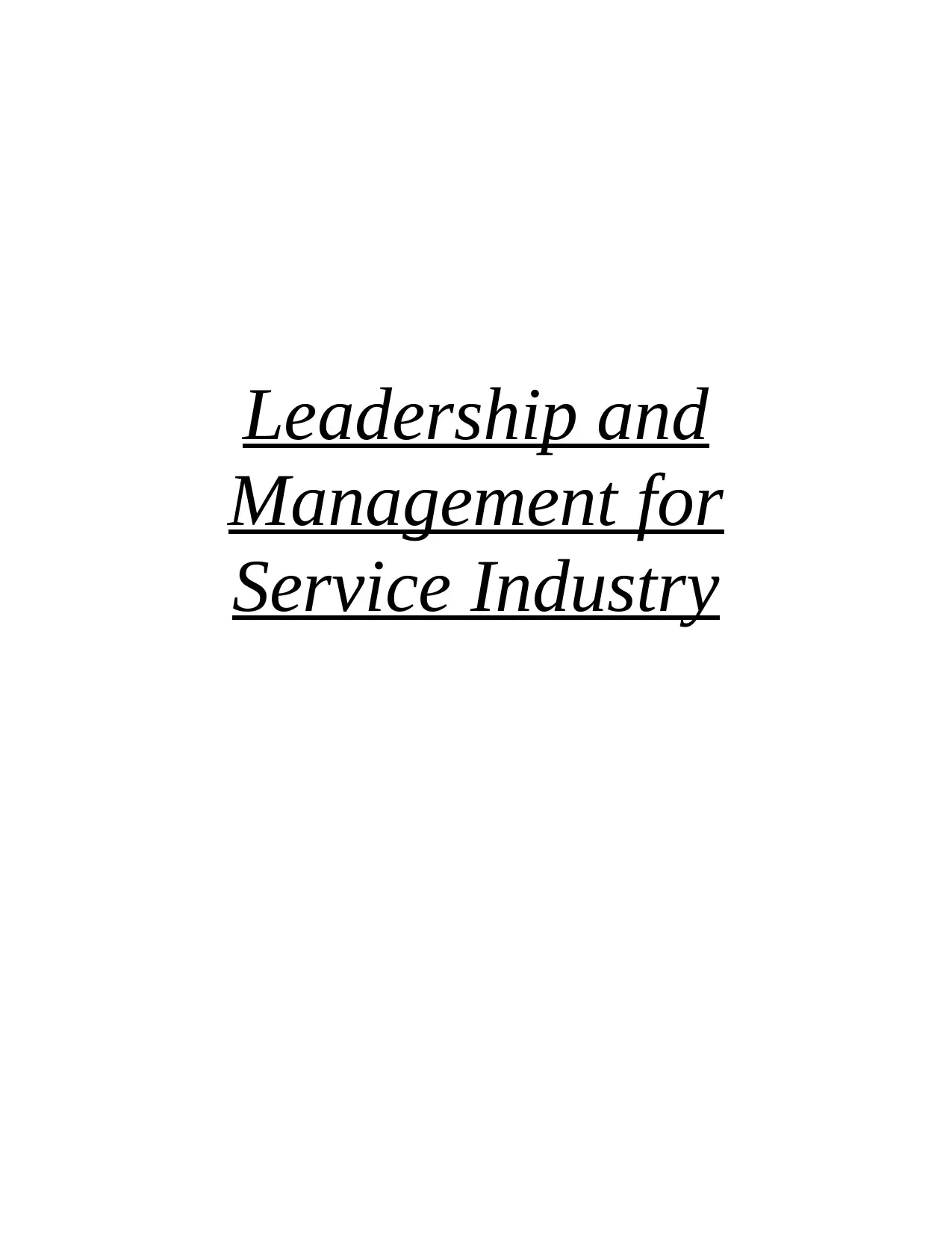
Leadership and
Management for
Service Industry
Management for
Service Industry
Paraphrase This Document
Need a fresh take? Get an instant paraphrase of this document with our AI Paraphraser
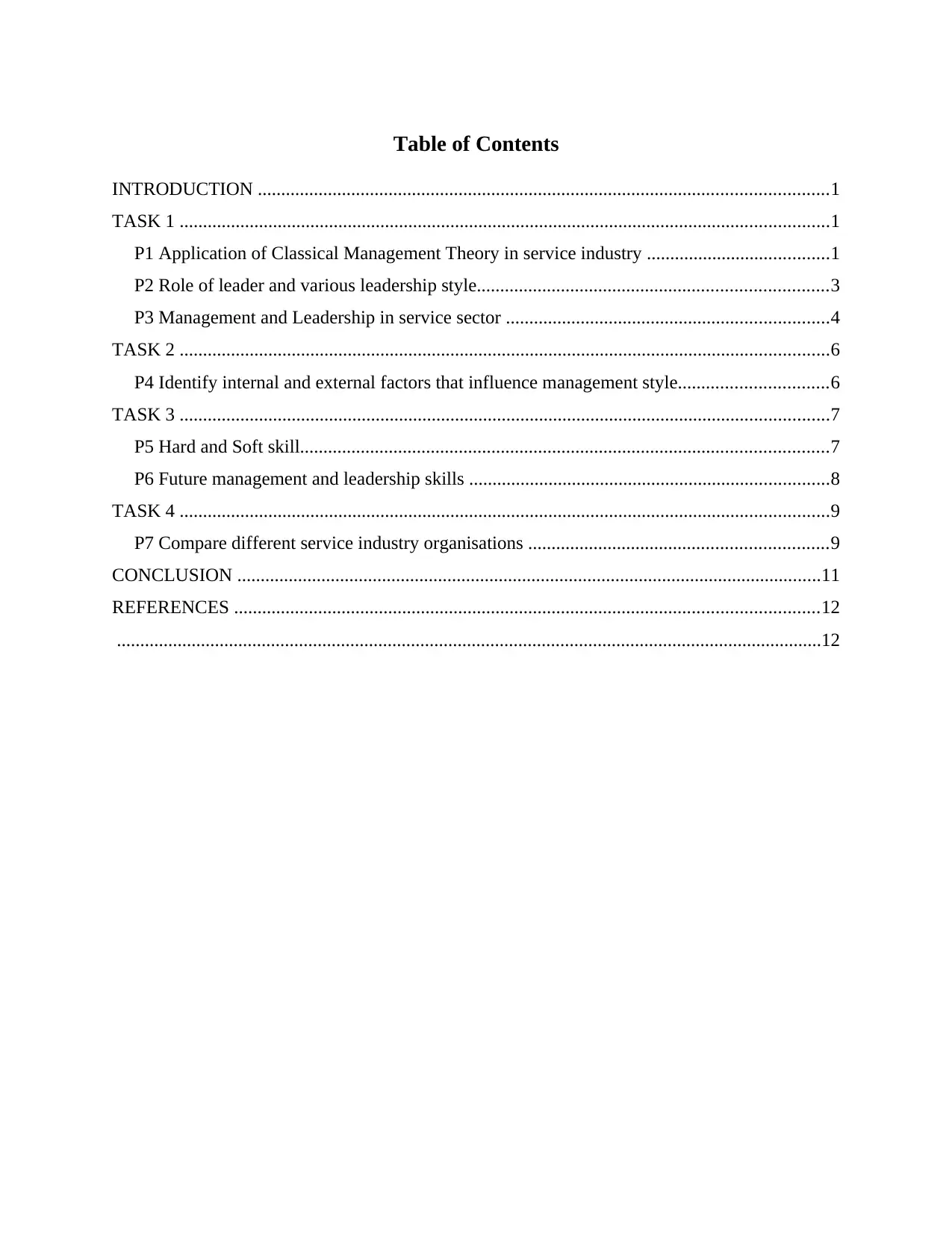
Table of Contents
INTRODUCTION ..........................................................................................................................1
TASK 1 ...........................................................................................................................................1
P1 Application of Classical Management Theory in service industry .......................................1
P2 Role of leader and various leadership style...........................................................................3
P3 Management and Leadership in service sector .....................................................................4
TASK 2 ...........................................................................................................................................6
P4 Identify internal and external factors that influence management style................................6
TASK 3 ...........................................................................................................................................7
P5 Hard and Soft skill.................................................................................................................7
P6 Future management and leadership skills .............................................................................8
TASK 4 ...........................................................................................................................................9
P7 Compare different service industry organisations ................................................................9
CONCLUSION .............................................................................................................................11
REFERENCES .............................................................................................................................12
.......................................................................................................................................................12
INTRODUCTION ..........................................................................................................................1
TASK 1 ...........................................................................................................................................1
P1 Application of Classical Management Theory in service industry .......................................1
P2 Role of leader and various leadership style...........................................................................3
P3 Management and Leadership in service sector .....................................................................4
TASK 2 ...........................................................................................................................................6
P4 Identify internal and external factors that influence management style................................6
TASK 3 ...........................................................................................................................................7
P5 Hard and Soft skill.................................................................................................................7
P6 Future management and leadership skills .............................................................................8
TASK 4 ...........................................................................................................................................9
P7 Compare different service industry organisations ................................................................9
CONCLUSION .............................................................................................................................11
REFERENCES .............................................................................................................................12
.......................................................................................................................................................12
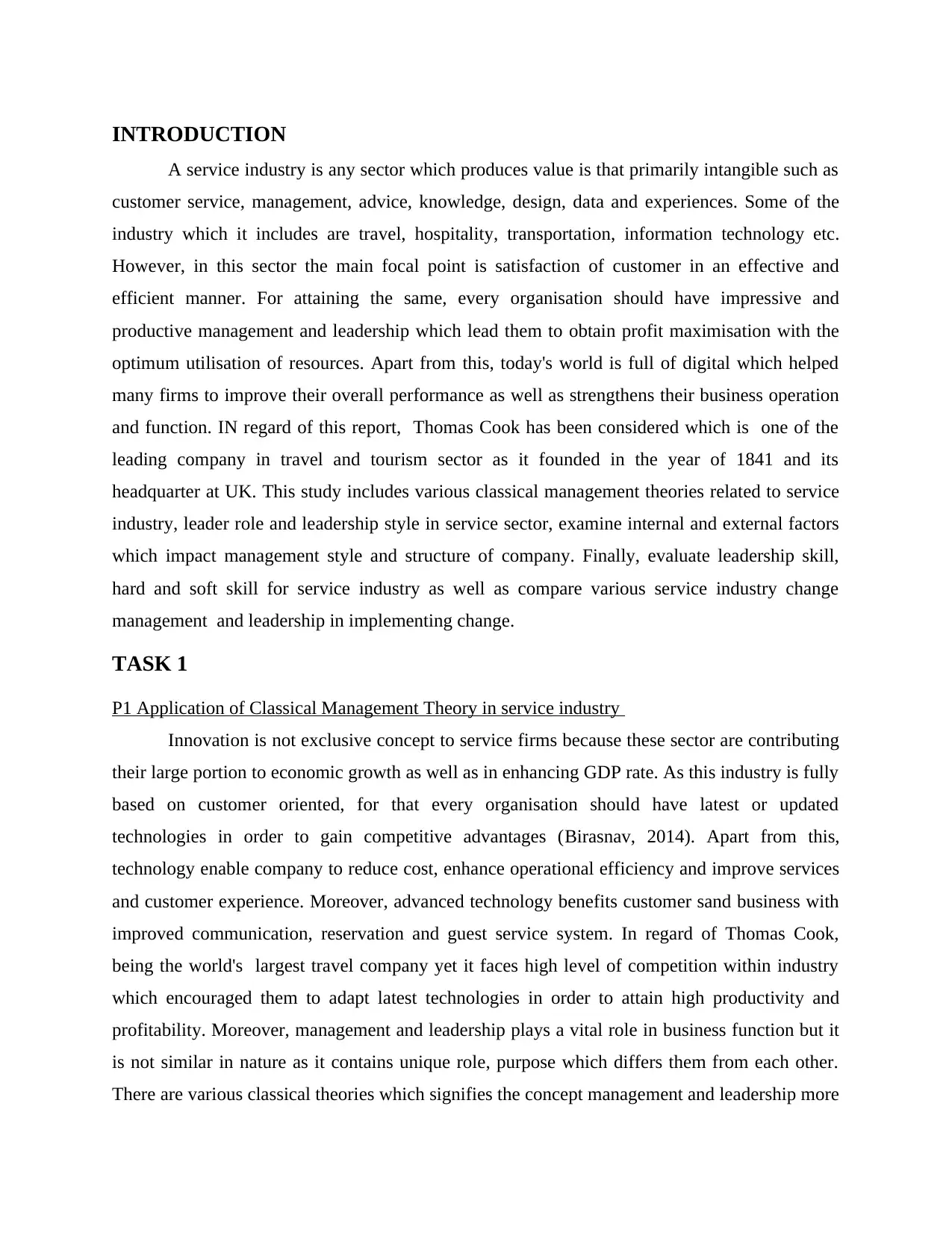
INTRODUCTION
A service industry is any sector which produces value is that primarily intangible such as
customer service, management, advice, knowledge, design, data and experiences. Some of the
industry which it includes are travel, hospitality, transportation, information technology etc.
However, in this sector the main focal point is satisfaction of customer in an effective and
efficient manner. For attaining the same, every organisation should have impressive and
productive management and leadership which lead them to obtain profit maximisation with the
optimum utilisation of resources. Apart from this, today's world is full of digital which helped
many firms to improve their overall performance as well as strengthens their business operation
and function. IN regard of this report, Thomas Cook has been considered which is one of the
leading company in travel and tourism sector as it founded in the year of 1841 and its
headquarter at UK. This study includes various classical management theories related to service
industry, leader role and leadership style in service sector, examine internal and external factors
which impact management style and structure of company. Finally, evaluate leadership skill,
hard and soft skill for service industry as well as compare various service industry change
management and leadership in implementing change.
TASK 1
P1 Application of Classical Management Theory in service industry
Innovation is not exclusive concept to service firms because these sector are contributing
their large portion to economic growth as well as in enhancing GDP rate. As this industry is fully
based on customer oriented, for that every organisation should have latest or updated
technologies in order to gain competitive advantages (Birasnav, 2014). Apart from this,
technology enable company to reduce cost, enhance operational efficiency and improve services
and customer experience. Moreover, advanced technology benefits customer sand business with
improved communication, reservation and guest service system. In regard of Thomas Cook,
being the world's largest travel company yet it faces high level of competition within industry
which encouraged them to adapt latest technologies in order to attain high productivity and
profitability. Moreover, management and leadership plays a vital role in business function but it
is not similar in nature as it contains unique role, purpose which differs them from each other.
There are various classical theories which signifies the concept management and leadership more
A service industry is any sector which produces value is that primarily intangible such as
customer service, management, advice, knowledge, design, data and experiences. Some of the
industry which it includes are travel, hospitality, transportation, information technology etc.
However, in this sector the main focal point is satisfaction of customer in an effective and
efficient manner. For attaining the same, every organisation should have impressive and
productive management and leadership which lead them to obtain profit maximisation with the
optimum utilisation of resources. Apart from this, today's world is full of digital which helped
many firms to improve their overall performance as well as strengthens their business operation
and function. IN regard of this report, Thomas Cook has been considered which is one of the
leading company in travel and tourism sector as it founded in the year of 1841 and its
headquarter at UK. This study includes various classical management theories related to service
industry, leader role and leadership style in service sector, examine internal and external factors
which impact management style and structure of company. Finally, evaluate leadership skill,
hard and soft skill for service industry as well as compare various service industry change
management and leadership in implementing change.
TASK 1
P1 Application of Classical Management Theory in service industry
Innovation is not exclusive concept to service firms because these sector are contributing
their large portion to economic growth as well as in enhancing GDP rate. As this industry is fully
based on customer oriented, for that every organisation should have latest or updated
technologies in order to gain competitive advantages (Birasnav, 2014). Apart from this,
technology enable company to reduce cost, enhance operational efficiency and improve services
and customer experience. Moreover, advanced technology benefits customer sand business with
improved communication, reservation and guest service system. In regard of Thomas Cook,
being the world's largest travel company yet it faces high level of competition within industry
which encouraged them to adapt latest technologies in order to attain high productivity and
profitability. Moreover, management and leadership plays a vital role in business function but it
is not similar in nature as it contains unique role, purpose which differs them from each other.
There are various classical theories which signifies the concept management and leadership more
⊘ This is a preview!⊘
Do you want full access?
Subscribe today to unlock all pages.

Trusted by 1+ million students worldwide
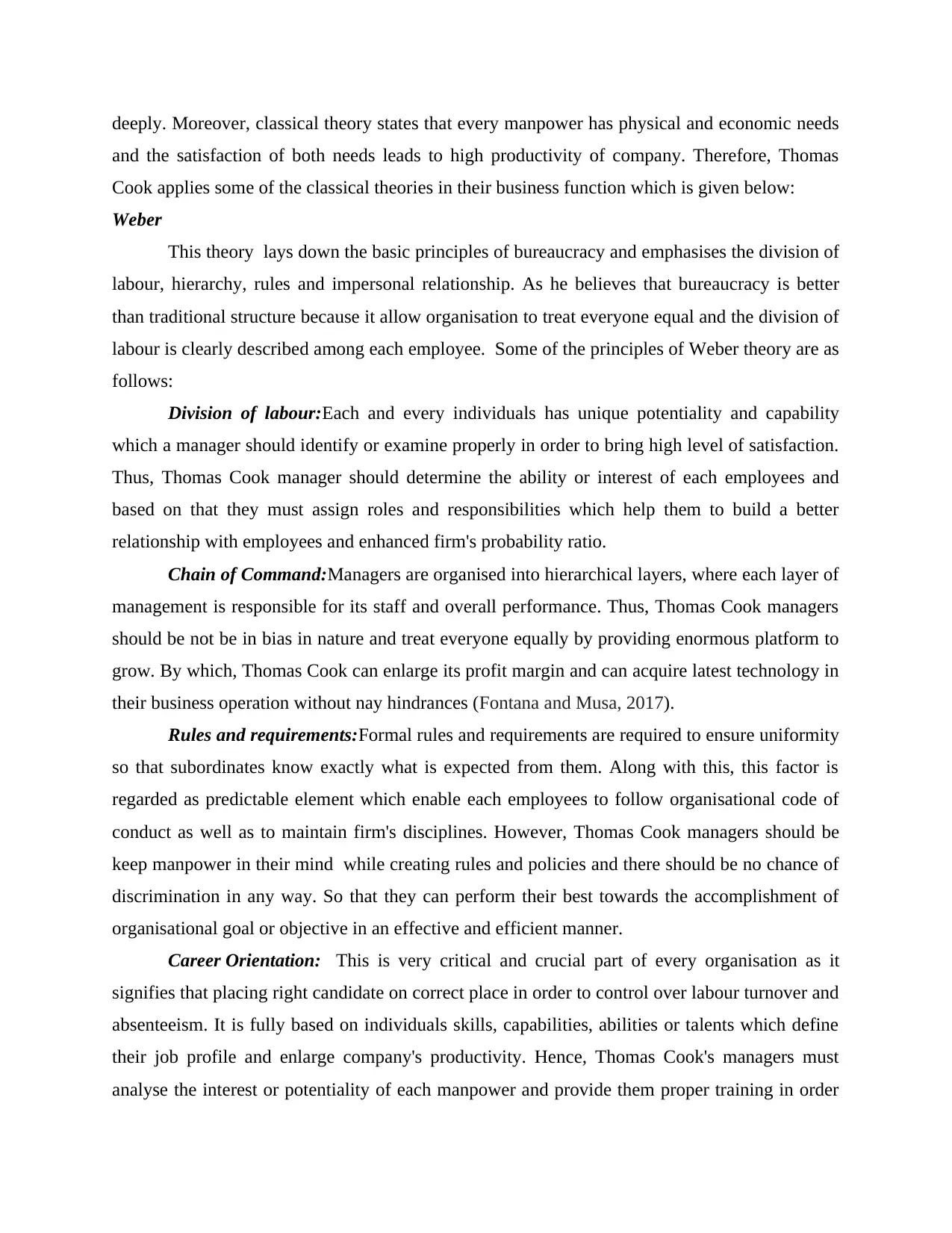
deeply. Moreover, classical theory states that every manpower has physical and economic needs
and the satisfaction of both needs leads to high productivity of company. Therefore, Thomas
Cook applies some of the classical theories in their business function which is given below:
Weber
This theory lays down the basic principles of bureaucracy and emphasises the division of
labour, hierarchy, rules and impersonal relationship. As he believes that bureaucracy is better
than traditional structure because it allow organisation to treat everyone equal and the division of
labour is clearly described among each employee. Some of the principles of Weber theory are as
follows:
Division of labour:Each and every individuals has unique potentiality and capability
which a manager should identify or examine properly in order to bring high level of satisfaction.
Thus, Thomas Cook manager should determine the ability or interest of each employees and
based on that they must assign roles and responsibilities which help them to build a better
relationship with employees and enhanced firm's probability ratio.
Chain of Command:Managers are organised into hierarchical layers, where each layer of
management is responsible for its staff and overall performance. Thus, Thomas Cook managers
should be not be in bias in nature and treat everyone equally by providing enormous platform to
grow. By which, Thomas Cook can enlarge its profit margin and can acquire latest technology in
their business operation without nay hindrances (Fontana and Musa, 2017).
Rules and requirements:Formal rules and requirements are required to ensure uniformity
so that subordinates know exactly what is expected from them. Along with this, this factor is
regarded as predictable element which enable each employees to follow organisational code of
conduct as well as to maintain firm's disciplines. However, Thomas Cook managers should be
keep manpower in their mind while creating rules and policies and there should be no chance of
discrimination in any way. So that they can perform their best towards the accomplishment of
organisational goal or objective in an effective and efficient manner.
Career Orientation: This is very critical and crucial part of every organisation as it
signifies that placing right candidate on correct place in order to control over labour turnover and
absenteeism. It is fully based on individuals skills, capabilities, abilities or talents which define
their job profile and enlarge company's productivity. Hence, Thomas Cook's managers must
analyse the interest or potentiality of each manpower and provide them proper training in order
and the satisfaction of both needs leads to high productivity of company. Therefore, Thomas
Cook applies some of the classical theories in their business function which is given below:
Weber
This theory lays down the basic principles of bureaucracy and emphasises the division of
labour, hierarchy, rules and impersonal relationship. As he believes that bureaucracy is better
than traditional structure because it allow organisation to treat everyone equal and the division of
labour is clearly described among each employee. Some of the principles of Weber theory are as
follows:
Division of labour:Each and every individuals has unique potentiality and capability
which a manager should identify or examine properly in order to bring high level of satisfaction.
Thus, Thomas Cook manager should determine the ability or interest of each employees and
based on that they must assign roles and responsibilities which help them to build a better
relationship with employees and enhanced firm's probability ratio.
Chain of Command:Managers are organised into hierarchical layers, where each layer of
management is responsible for its staff and overall performance. Thus, Thomas Cook managers
should be not be in bias in nature and treat everyone equally by providing enormous platform to
grow. By which, Thomas Cook can enlarge its profit margin and can acquire latest technology in
their business operation without nay hindrances (Fontana and Musa, 2017).
Rules and requirements:Formal rules and requirements are required to ensure uniformity
so that subordinates know exactly what is expected from them. Along with this, this factor is
regarded as predictable element which enable each employees to follow organisational code of
conduct as well as to maintain firm's disciplines. However, Thomas Cook managers should be
keep manpower in their mind while creating rules and policies and there should be no chance of
discrimination in any way. So that they can perform their best towards the accomplishment of
organisational goal or objective in an effective and efficient manner.
Career Orientation: This is very critical and crucial part of every organisation as it
signifies that placing right candidate on correct place in order to control over labour turnover and
absenteeism. It is fully based on individuals skills, capabilities, abilities or talents which define
their job profile and enlarge company's productivity. Hence, Thomas Cook's managers must
analyse the interest or potentiality of each manpower and provide them proper training in order
Paraphrase This Document
Need a fresh take? Get an instant paraphrase of this document with our AI Paraphraser
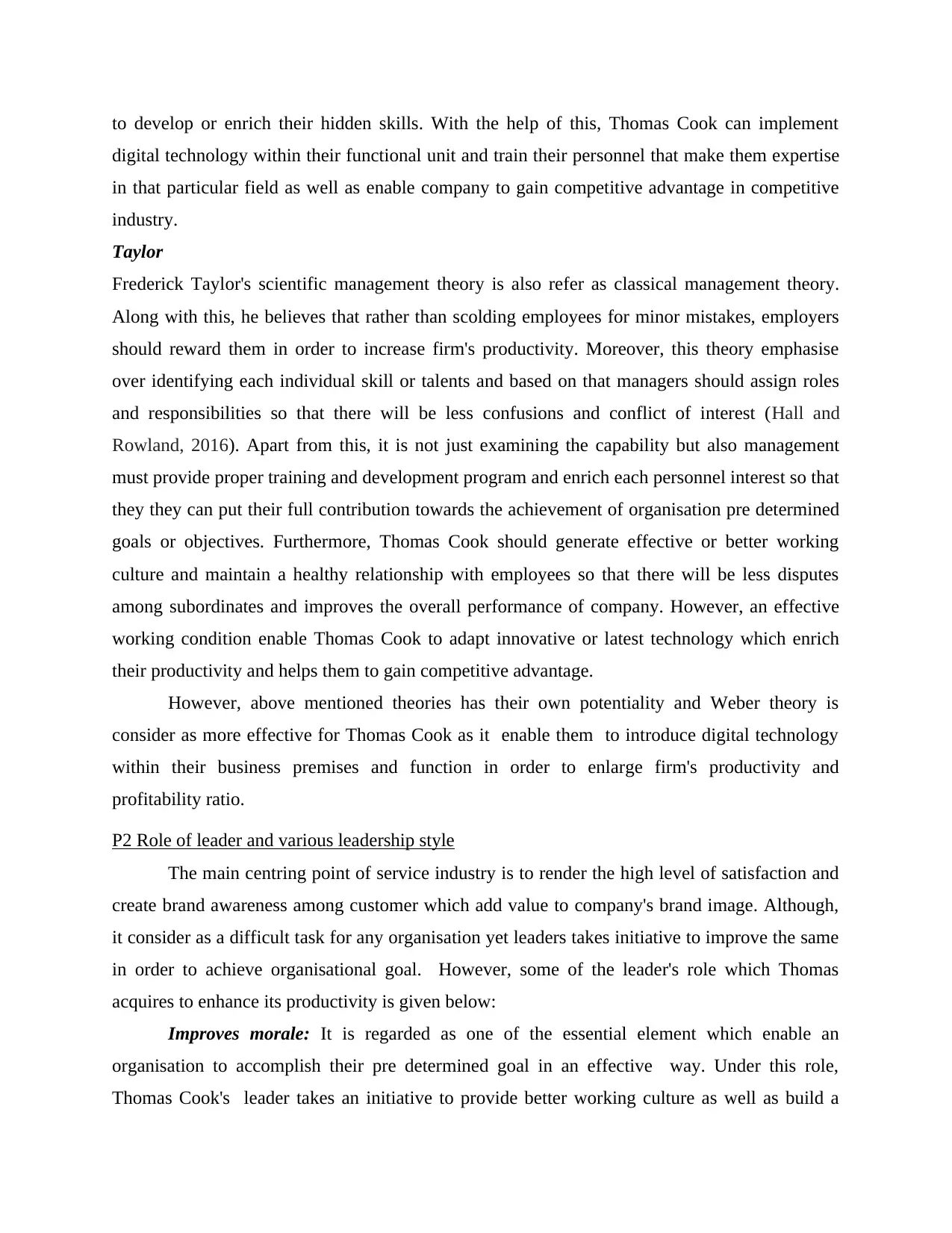
to develop or enrich their hidden skills. With the help of this, Thomas Cook can implement
digital technology within their functional unit and train their personnel that make them expertise
in that particular field as well as enable company to gain competitive advantage in competitive
industry.
Taylor
Frederick Taylor's scientific management theory is also refer as classical management theory.
Along with this, he believes that rather than scolding employees for minor mistakes, employers
should reward them in order to increase firm's productivity. Moreover, this theory emphasise
over identifying each individual skill or talents and based on that managers should assign roles
and responsibilities so that there will be less confusions and conflict of interest (Hall and
Rowland, 2016). Apart from this, it is not just examining the capability but also management
must provide proper training and development program and enrich each personnel interest so that
they they can put their full contribution towards the achievement of organisation pre determined
goals or objectives. Furthermore, Thomas Cook should generate effective or better working
culture and maintain a healthy relationship with employees so that there will be less disputes
among subordinates and improves the overall performance of company. However, an effective
working condition enable Thomas Cook to adapt innovative or latest technology which enrich
their productivity and helps them to gain competitive advantage.
However, above mentioned theories has their own potentiality and Weber theory is
consider as more effective for Thomas Cook as it enable them to introduce digital technology
within their business premises and function in order to enlarge firm's productivity and
profitability ratio.
P2 Role of leader and various leadership style
The main centring point of service industry is to render the high level of satisfaction and
create brand awareness among customer which add value to company's brand image. Although,
it consider as a difficult task for any organisation yet leaders takes initiative to improve the same
in order to achieve organisational goal. However, some of the leader's role which Thomas
acquires to enhance its productivity is given below:
Improves morale: It is regarded as one of the essential element which enable an
organisation to accomplish their pre determined goal in an effective way. Under this role,
Thomas Cook's leader takes an initiative to provide better working culture as well as build a
digital technology within their functional unit and train their personnel that make them expertise
in that particular field as well as enable company to gain competitive advantage in competitive
industry.
Taylor
Frederick Taylor's scientific management theory is also refer as classical management theory.
Along with this, he believes that rather than scolding employees for minor mistakes, employers
should reward them in order to increase firm's productivity. Moreover, this theory emphasise
over identifying each individual skill or talents and based on that managers should assign roles
and responsibilities so that there will be less confusions and conflict of interest (Hall and
Rowland, 2016). Apart from this, it is not just examining the capability but also management
must provide proper training and development program and enrich each personnel interest so that
they they can put their full contribution towards the achievement of organisation pre determined
goals or objectives. Furthermore, Thomas Cook should generate effective or better working
culture and maintain a healthy relationship with employees so that there will be less disputes
among subordinates and improves the overall performance of company. However, an effective
working condition enable Thomas Cook to adapt innovative or latest technology which enrich
their productivity and helps them to gain competitive advantage.
However, above mentioned theories has their own potentiality and Weber theory is
consider as more effective for Thomas Cook as it enable them to introduce digital technology
within their business premises and function in order to enlarge firm's productivity and
profitability ratio.
P2 Role of leader and various leadership style
The main centring point of service industry is to render the high level of satisfaction and
create brand awareness among customer which add value to company's brand image. Although,
it consider as a difficult task for any organisation yet leaders takes initiative to improve the same
in order to achieve organisational goal. However, some of the leader's role which Thomas
acquires to enhance its productivity is given below:
Improves morale: It is regarded as one of the essential element which enable an
organisation to accomplish their pre determined goal in an effective way. Under this role,
Thomas Cook's leader takes an initiative to provide better working culture as well as build a
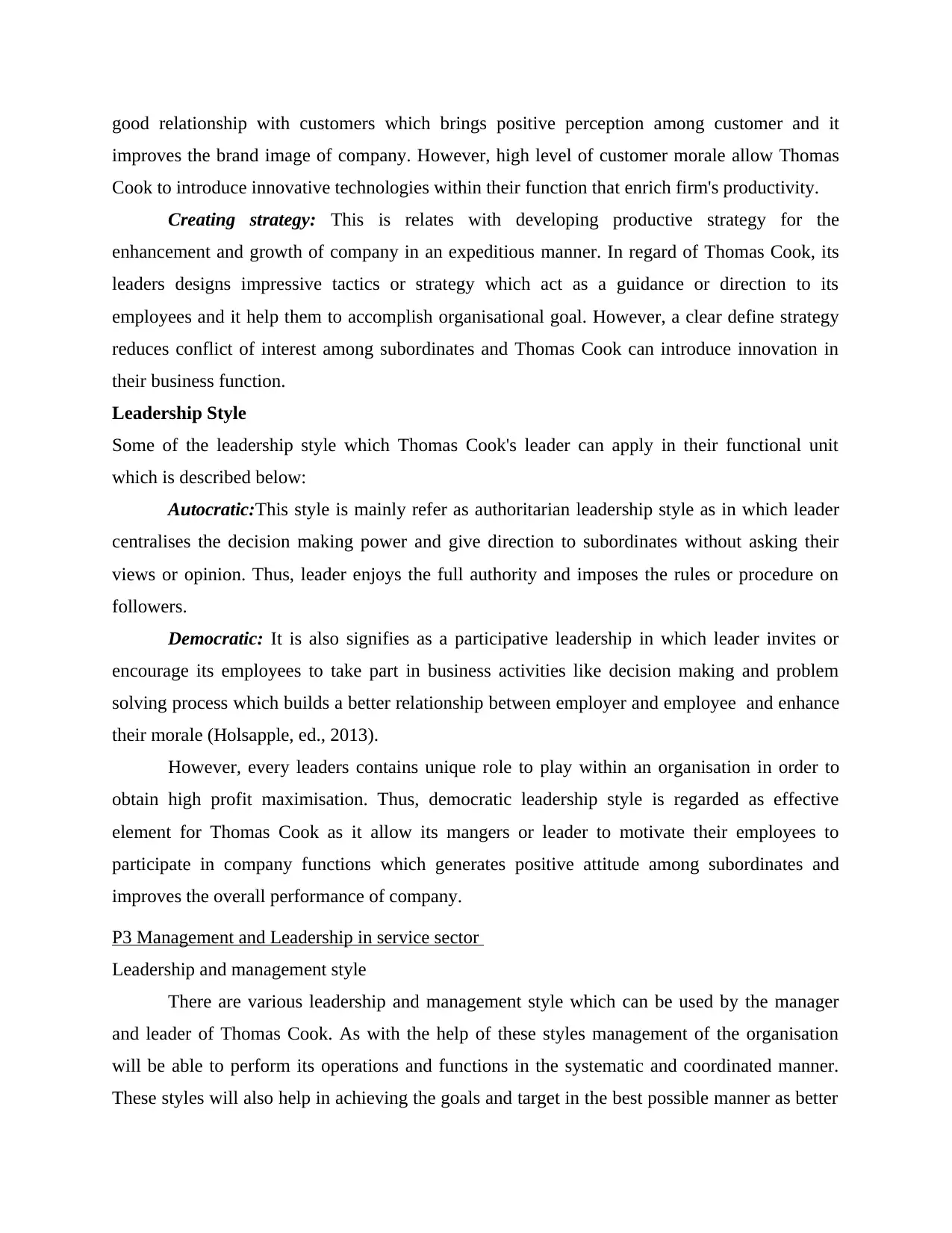
good relationship with customers which brings positive perception among customer and it
improves the brand image of company. However, high level of customer morale allow Thomas
Cook to introduce innovative technologies within their function that enrich firm's productivity.
Creating strategy: This is relates with developing productive strategy for the
enhancement and growth of company in an expeditious manner. In regard of Thomas Cook, its
leaders designs impressive tactics or strategy which act as a guidance or direction to its
employees and it help them to accomplish organisational goal. However, a clear define strategy
reduces conflict of interest among subordinates and Thomas Cook can introduce innovation in
their business function.
Leadership Style
Some of the leadership style which Thomas Cook's leader can apply in their functional unit
which is described below:
Autocratic:This style is mainly refer as authoritarian leadership style as in which leader
centralises the decision making power and give direction to subordinates without asking their
views or opinion. Thus, leader enjoys the full authority and imposes the rules or procedure on
followers.
Democratic: It is also signifies as a participative leadership in which leader invites or
encourage its employees to take part in business activities like decision making and problem
solving process which builds a better relationship between employer and employee and enhance
their morale (Holsapple, ed., 2013).
However, every leaders contains unique role to play within an organisation in order to
obtain high profit maximisation. Thus, democratic leadership style is regarded as effective
element for Thomas Cook as it allow its mangers or leader to motivate their employees to
participate in company functions which generates positive attitude among subordinates and
improves the overall performance of company.
P3 Management and Leadership in service sector
Leadership and management style
There are various leadership and management style which can be used by the manager
and leader of Thomas Cook. As with the help of these styles management of the organisation
will be able to perform its operations and functions in the systematic and coordinated manner.
These styles will also help in achieving the goals and target in the best possible manner as better
improves the brand image of company. However, high level of customer morale allow Thomas
Cook to introduce innovative technologies within their function that enrich firm's productivity.
Creating strategy: This is relates with developing productive strategy for the
enhancement and growth of company in an expeditious manner. In regard of Thomas Cook, its
leaders designs impressive tactics or strategy which act as a guidance or direction to its
employees and it help them to accomplish organisational goal. However, a clear define strategy
reduces conflict of interest among subordinates and Thomas Cook can introduce innovation in
their business function.
Leadership Style
Some of the leadership style which Thomas Cook's leader can apply in their functional unit
which is described below:
Autocratic:This style is mainly refer as authoritarian leadership style as in which leader
centralises the decision making power and give direction to subordinates without asking their
views or opinion. Thus, leader enjoys the full authority and imposes the rules or procedure on
followers.
Democratic: It is also signifies as a participative leadership in which leader invites or
encourage its employees to take part in business activities like decision making and problem
solving process which builds a better relationship between employer and employee and enhance
their morale (Holsapple, ed., 2013).
However, every leaders contains unique role to play within an organisation in order to
obtain high profit maximisation. Thus, democratic leadership style is regarded as effective
element for Thomas Cook as it allow its mangers or leader to motivate their employees to
participate in company functions which generates positive attitude among subordinates and
improves the overall performance of company.
P3 Management and Leadership in service sector
Leadership and management style
There are various leadership and management style which can be used by the manager
and leader of Thomas Cook. As with the help of these styles management of the organisation
will be able to perform its operations and functions in the systematic and coordinated manner.
These styles will also help in achieving the goals and target in the best possible manner as better
⊘ This is a preview!⊘
Do you want full access?
Subscribe today to unlock all pages.

Trusted by 1+ million students worldwide
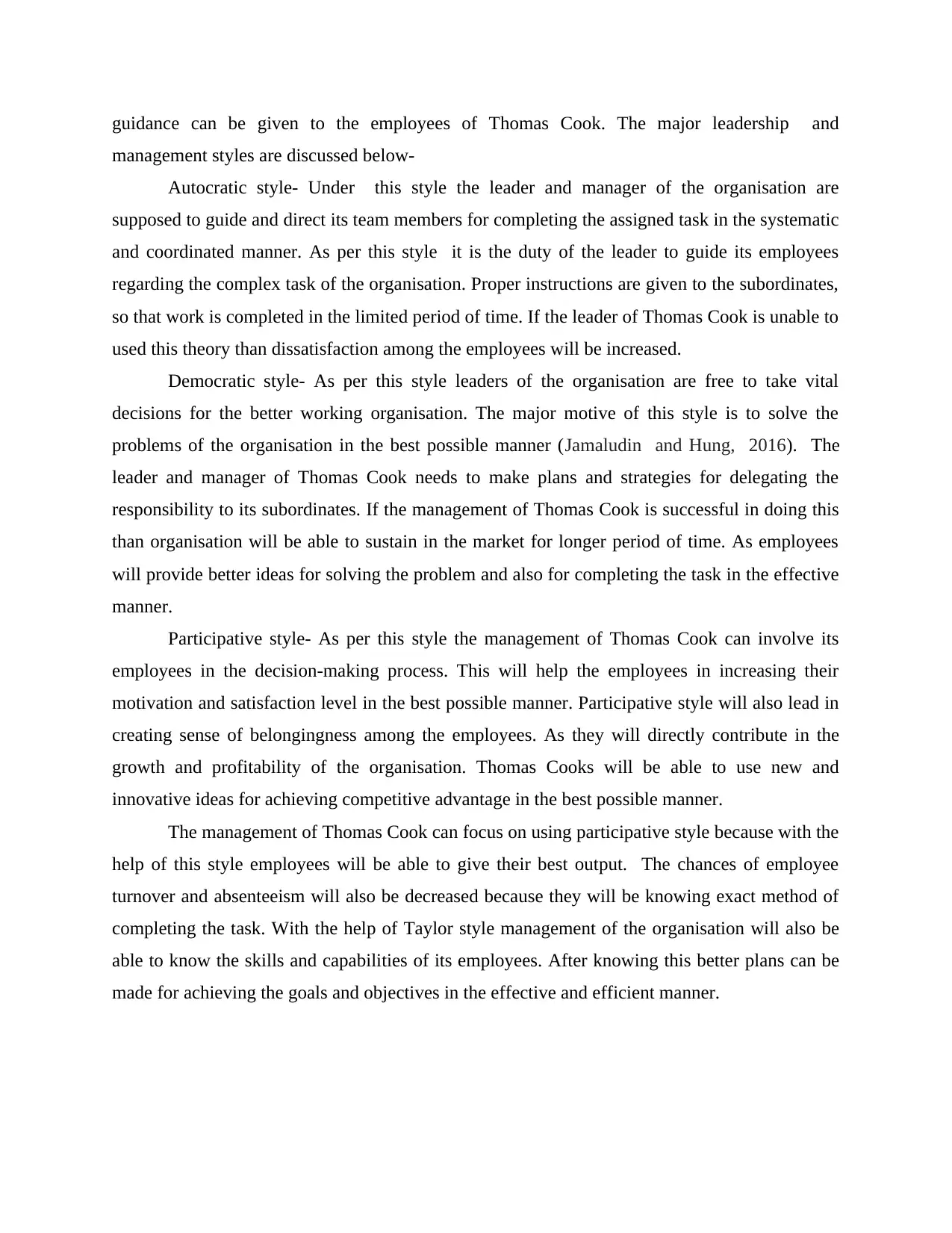
guidance can be given to the employees of Thomas Cook. The major leadership and
management styles are discussed below-
Autocratic style- Under this style the leader and manager of the organisation are
supposed to guide and direct its team members for completing the assigned task in the systematic
and coordinated manner. As per this style it is the duty of the leader to guide its employees
regarding the complex task of the organisation. Proper instructions are given to the subordinates,
so that work is completed in the limited period of time. If the leader of Thomas Cook is unable to
used this theory than dissatisfaction among the employees will be increased.
Democratic style- As per this style leaders of the organisation are free to take vital
decisions for the better working organisation. The major motive of this style is to solve the
problems of the organisation in the best possible manner (Jamaludin and Hung, 2016). The
leader and manager of Thomas Cook needs to make plans and strategies for delegating the
responsibility to its subordinates. If the management of Thomas Cook is successful in doing this
than organisation will be able to sustain in the market for longer period of time. As employees
will provide better ideas for solving the problem and also for completing the task in the effective
manner.
Participative style- As per this style the management of Thomas Cook can involve its
employees in the decision-making process. This will help the employees in increasing their
motivation and satisfaction level in the best possible manner. Participative style will also lead in
creating sense of belongingness among the employees. As they will directly contribute in the
growth and profitability of the organisation. Thomas Cooks will be able to use new and
innovative ideas for achieving competitive advantage in the best possible manner.
The management of Thomas Cook can focus on using participative style because with the
help of this style employees will be able to give their best output. The chances of employee
turnover and absenteeism will also be decreased because they will be knowing exact method of
completing the task. With the help of Taylor style management of the organisation will also be
able to know the skills and capabilities of its employees. After knowing this better plans can be
made for achieving the goals and objectives in the effective and efficient manner.
management styles are discussed below-
Autocratic style- Under this style the leader and manager of the organisation are
supposed to guide and direct its team members for completing the assigned task in the systematic
and coordinated manner. As per this style it is the duty of the leader to guide its employees
regarding the complex task of the organisation. Proper instructions are given to the subordinates,
so that work is completed in the limited period of time. If the leader of Thomas Cook is unable to
used this theory than dissatisfaction among the employees will be increased.
Democratic style- As per this style leaders of the organisation are free to take vital
decisions for the better working organisation. The major motive of this style is to solve the
problems of the organisation in the best possible manner (Jamaludin and Hung, 2016). The
leader and manager of Thomas Cook needs to make plans and strategies for delegating the
responsibility to its subordinates. If the management of Thomas Cook is successful in doing this
than organisation will be able to sustain in the market for longer period of time. As employees
will provide better ideas for solving the problem and also for completing the task in the effective
manner.
Participative style- As per this style the management of Thomas Cook can involve its
employees in the decision-making process. This will help the employees in increasing their
motivation and satisfaction level in the best possible manner. Participative style will also lead in
creating sense of belongingness among the employees. As they will directly contribute in the
growth and profitability of the organisation. Thomas Cooks will be able to use new and
innovative ideas for achieving competitive advantage in the best possible manner.
The management of Thomas Cook can focus on using participative style because with the
help of this style employees will be able to give their best output. The chances of employee
turnover and absenteeism will also be decreased because they will be knowing exact method of
completing the task. With the help of Taylor style management of the organisation will also be
able to know the skills and capabilities of its employees. After knowing this better plans can be
made for achieving the goals and objectives in the effective and efficient manner.
Paraphrase This Document
Need a fresh take? Get an instant paraphrase of this document with our AI Paraphraser
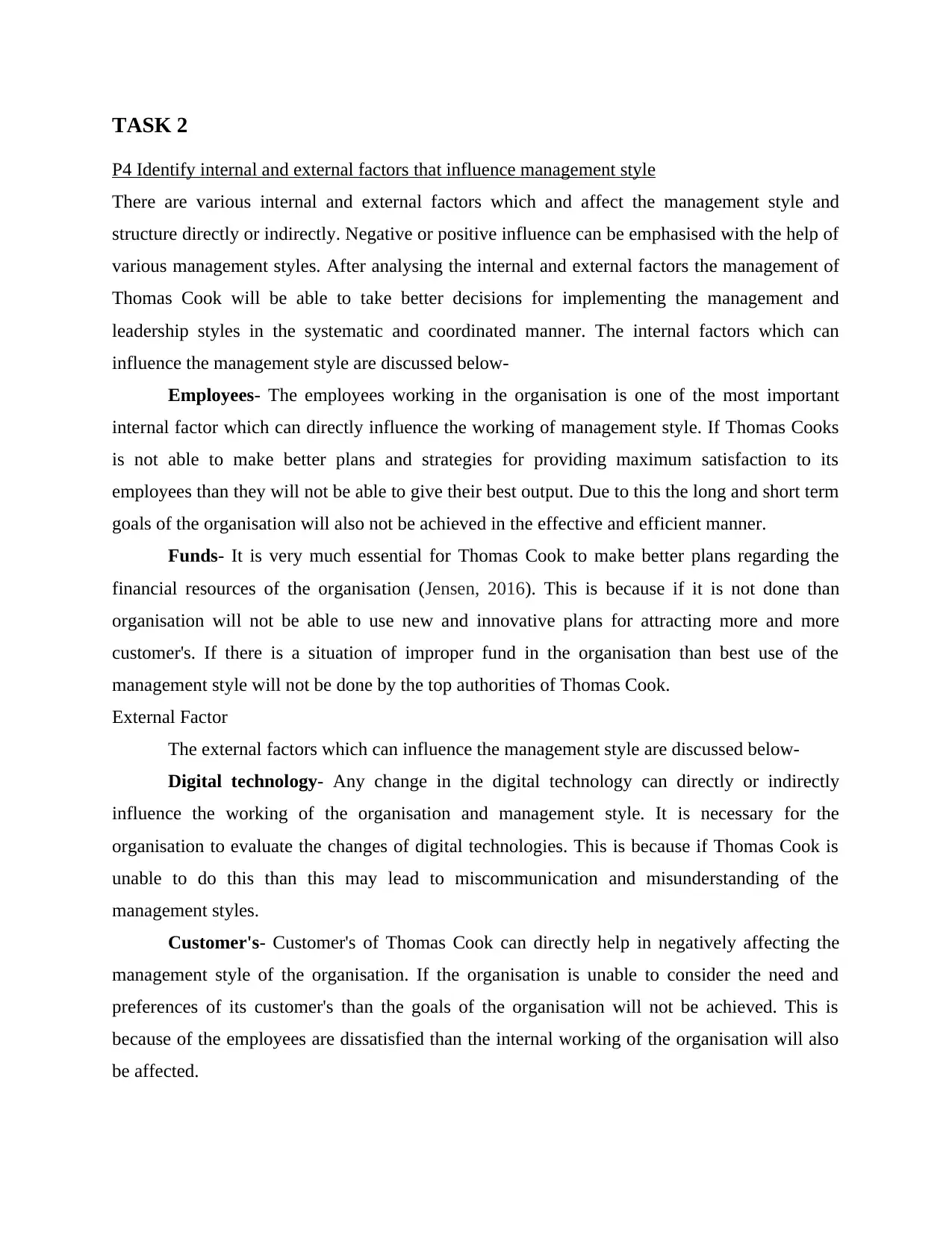
TASK 2
P4 Identify internal and external factors that influence management style
There are various internal and external factors which and affect the management style and
structure directly or indirectly. Negative or positive influence can be emphasised with the help of
various management styles. After analysing the internal and external factors the management of
Thomas Cook will be able to take better decisions for implementing the management and
leadership styles in the systematic and coordinated manner. The internal factors which can
influence the management style are discussed below-
Employees- The employees working in the organisation is one of the most important
internal factor which can directly influence the working of management style. If Thomas Cooks
is not able to make better plans and strategies for providing maximum satisfaction to its
employees than they will not be able to give their best output. Due to this the long and short term
goals of the organisation will also not be achieved in the effective and efficient manner.
Funds- It is very much essential for Thomas Cook to make better plans regarding the
financial resources of the organisation (Jensen, 2016). This is because if it is not done than
organisation will not be able to use new and innovative plans for attracting more and more
customer's. If there is a situation of improper fund in the organisation than best use of the
management style will not be done by the top authorities of Thomas Cook.
External Factor
The external factors which can influence the management style are discussed below-
Digital technology- Any change in the digital technology can directly or indirectly
influence the working of the organisation and management style. It is necessary for the
organisation to evaluate the changes of digital technologies. This is because if Thomas Cook is
unable to do this than this may lead to miscommunication and misunderstanding of the
management styles.
Customer's- Customer's of Thomas Cook can directly help in negatively affecting the
management style of the organisation. If the organisation is unable to consider the need and
preferences of its customer's than the goals of the organisation will not be achieved. This is
because of the employees are dissatisfied than the internal working of the organisation will also
be affected.
P4 Identify internal and external factors that influence management style
There are various internal and external factors which and affect the management style and
structure directly or indirectly. Negative or positive influence can be emphasised with the help of
various management styles. After analysing the internal and external factors the management of
Thomas Cook will be able to take better decisions for implementing the management and
leadership styles in the systematic and coordinated manner. The internal factors which can
influence the management style are discussed below-
Employees- The employees working in the organisation is one of the most important
internal factor which can directly influence the working of management style. If Thomas Cooks
is not able to make better plans and strategies for providing maximum satisfaction to its
employees than they will not be able to give their best output. Due to this the long and short term
goals of the organisation will also not be achieved in the effective and efficient manner.
Funds- It is very much essential for Thomas Cook to make better plans regarding the
financial resources of the organisation (Jensen, 2016). This is because if it is not done than
organisation will not be able to use new and innovative plans for attracting more and more
customer's. If there is a situation of improper fund in the organisation than best use of the
management style will not be done by the top authorities of Thomas Cook.
External Factor
The external factors which can influence the management style are discussed below-
Digital technology- Any change in the digital technology can directly or indirectly
influence the working of the organisation and management style. It is necessary for the
organisation to evaluate the changes of digital technologies. This is because if Thomas Cook is
unable to do this than this may lead to miscommunication and misunderstanding of the
management styles.
Customer's- Customer's of Thomas Cook can directly help in negatively affecting the
management style of the organisation. If the organisation is unable to consider the need and
preferences of its customer's than the goals of the organisation will not be achieved. This is
because of the employees are dissatisfied than the internal working of the organisation will also
be affected.
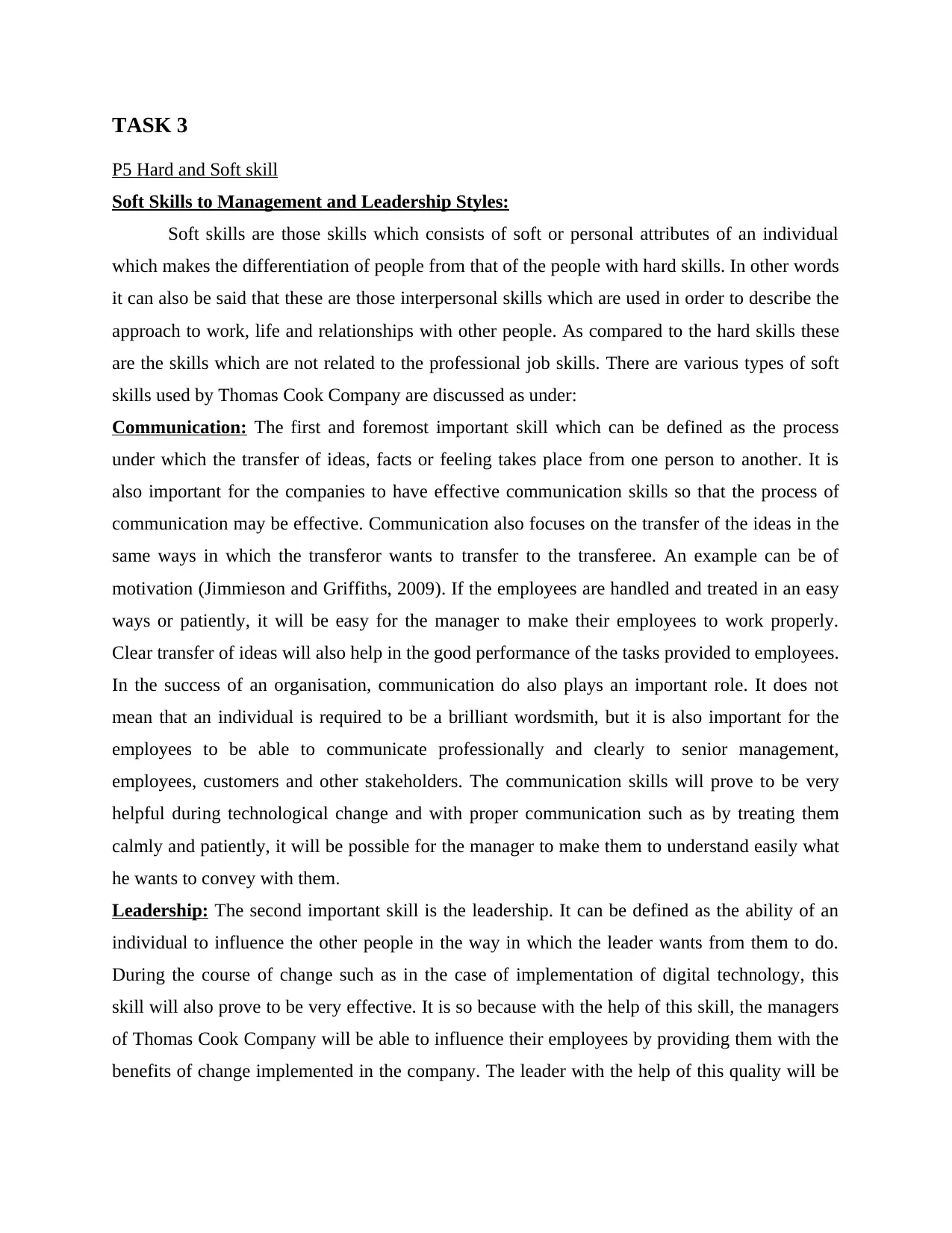
TASK 3
P5 Hard and Soft skill
Soft Skills to Management and Leadership Styles:
Soft skills are those skills which consists of soft or personal attributes of an individual
which makes the differentiation of people from that of the people with hard skills. In other words
it can also be said that these are those interpersonal skills which are used in order to describe the
approach to work, life and relationships with other people. As compared to the hard skills these
are the skills which are not related to the professional job skills. There are various types of soft
skills used by Thomas Cook Company are discussed as under:
Communication: The first and foremost important skill which can be defined as the process
under which the transfer of ideas, facts or feeling takes place from one person to another. It is
also important for the companies to have effective communication skills so that the process of
communication may be effective. Communication also focuses on the transfer of the ideas in the
same ways in which the transferor wants to transfer to the transferee. An example can be of
motivation (Jimmieson and Griffiths, 2009). If the employees are handled and treated in an easy
ways or patiently, it will be easy for the manager to make their employees to work properly.
Clear transfer of ideas will also help in the good performance of the tasks provided to employees.
In the success of an organisation, communication do also plays an important role. It does not
mean that an individual is required to be a brilliant wordsmith, but it is also important for the
employees to be able to communicate professionally and clearly to senior management,
employees, customers and other stakeholders. The communication skills will prove to be very
helpful during technological change and with proper communication such as by treating them
calmly and patiently, it will be possible for the manager to make them to understand easily what
he wants to convey with them.
Leadership: The second important skill is the leadership. It can be defined as the ability of an
individual to influence the other people in the way in which the leader wants from them to do.
During the course of change such as in the case of implementation of digital technology, this
skill will also prove to be very effective. It is so because with the help of this skill, the managers
of Thomas Cook Company will be able to influence their employees by providing them with the
benefits of change implemented in the company. The leader with the help of this quality will be
P5 Hard and Soft skill
Soft Skills to Management and Leadership Styles:
Soft skills are those skills which consists of soft or personal attributes of an individual
which makes the differentiation of people from that of the people with hard skills. In other words
it can also be said that these are those interpersonal skills which are used in order to describe the
approach to work, life and relationships with other people. As compared to the hard skills these
are the skills which are not related to the professional job skills. There are various types of soft
skills used by Thomas Cook Company are discussed as under:
Communication: The first and foremost important skill which can be defined as the process
under which the transfer of ideas, facts or feeling takes place from one person to another. It is
also important for the companies to have effective communication skills so that the process of
communication may be effective. Communication also focuses on the transfer of the ideas in the
same ways in which the transferor wants to transfer to the transferee. An example can be of
motivation (Jimmieson and Griffiths, 2009). If the employees are handled and treated in an easy
ways or patiently, it will be easy for the manager to make their employees to work properly.
Clear transfer of ideas will also help in the good performance of the tasks provided to employees.
In the success of an organisation, communication do also plays an important role. It does not
mean that an individual is required to be a brilliant wordsmith, but it is also important for the
employees to be able to communicate professionally and clearly to senior management,
employees, customers and other stakeholders. The communication skills will prove to be very
helpful during technological change and with proper communication such as by treating them
calmly and patiently, it will be possible for the manager to make them to understand easily what
he wants to convey with them.
Leadership: The second important skill is the leadership. It can be defined as the ability of an
individual to influence the other people in the way in which the leader wants from them to do.
During the course of change such as in the case of implementation of digital technology, this
skill will also prove to be very effective. It is so because with the help of this skill, the managers
of Thomas Cook Company will be able to influence their employees by providing them with the
benefits of change implemented in the company. The leader with the help of this quality will be
⊘ This is a preview!⊘
Do you want full access?
Subscribe today to unlock all pages.

Trusted by 1+ million students worldwide
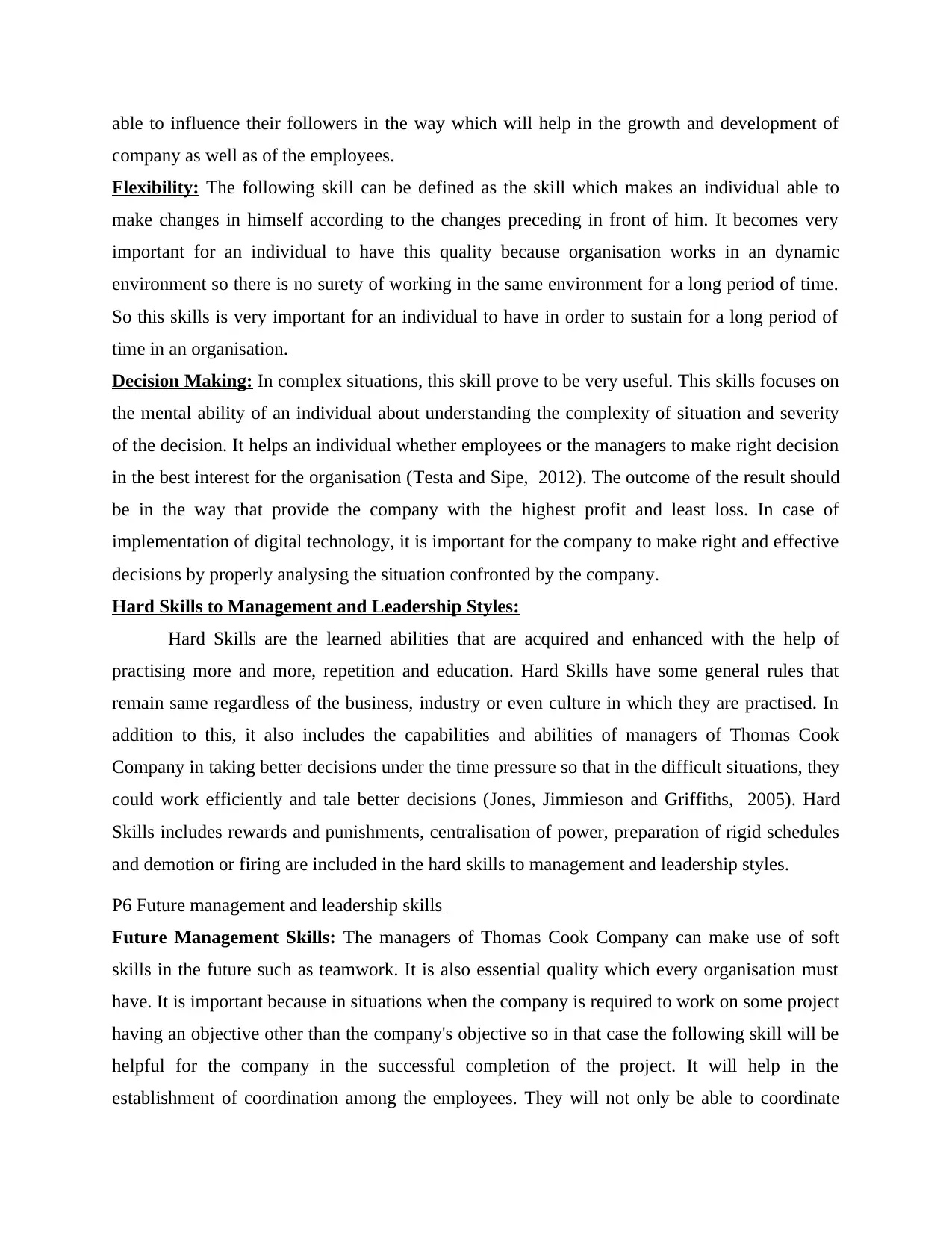
able to influence their followers in the way which will help in the growth and development of
company as well as of the employees.
Flexibility: The following skill can be defined as the skill which makes an individual able to
make changes in himself according to the changes preceding in front of him. It becomes very
important for an individual to have this quality because organisation works in an dynamic
environment so there is no surety of working in the same environment for a long period of time.
So this skills is very important for an individual to have in order to sustain for a long period of
time in an organisation.
Decision Making: In complex situations, this skill prove to be very useful. This skills focuses on
the mental ability of an individual about understanding the complexity of situation and severity
of the decision. It helps an individual whether employees or the managers to make right decision
in the best interest for the organisation (Testa and Sipe, 2012). The outcome of the result should
be in the way that provide the company with the highest profit and least loss. In case of
implementation of digital technology, it is important for the company to make right and effective
decisions by properly analysing the situation confronted by the company.
Hard Skills to Management and Leadership Styles:
Hard Skills are the learned abilities that are acquired and enhanced with the help of
practising more and more, repetition and education. Hard Skills have some general rules that
remain same regardless of the business, industry or even culture in which they are practised. In
addition to this, it also includes the capabilities and abilities of managers of Thomas Cook
Company in taking better decisions under the time pressure so that in the difficult situations, they
could work efficiently and tale better decisions (Jones, Jimmieson and Griffiths, 2005). Hard
Skills includes rewards and punishments, centralisation of power, preparation of rigid schedules
and demotion or firing are included in the hard skills to management and leadership styles.
P6 Future management and leadership skills
Future Management Skills: The managers of Thomas Cook Company can make use of soft
skills in the future such as teamwork. It is also essential quality which every organisation must
have. It is important because in situations when the company is required to work on some project
having an objective other than the company's objective so in that case the following skill will be
helpful for the company in the successful completion of the project. It will help in the
establishment of coordination among the employees. They will not only be able to coordinate
company as well as of the employees.
Flexibility: The following skill can be defined as the skill which makes an individual able to
make changes in himself according to the changes preceding in front of him. It becomes very
important for an individual to have this quality because organisation works in an dynamic
environment so there is no surety of working in the same environment for a long period of time.
So this skills is very important for an individual to have in order to sustain for a long period of
time in an organisation.
Decision Making: In complex situations, this skill prove to be very useful. This skills focuses on
the mental ability of an individual about understanding the complexity of situation and severity
of the decision. It helps an individual whether employees or the managers to make right decision
in the best interest for the organisation (Testa and Sipe, 2012). The outcome of the result should
be in the way that provide the company with the highest profit and least loss. In case of
implementation of digital technology, it is important for the company to make right and effective
decisions by properly analysing the situation confronted by the company.
Hard Skills to Management and Leadership Styles:
Hard Skills are the learned abilities that are acquired and enhanced with the help of
practising more and more, repetition and education. Hard Skills have some general rules that
remain same regardless of the business, industry or even culture in which they are practised. In
addition to this, it also includes the capabilities and abilities of managers of Thomas Cook
Company in taking better decisions under the time pressure so that in the difficult situations, they
could work efficiently and tale better decisions (Jones, Jimmieson and Griffiths, 2005). Hard
Skills includes rewards and punishments, centralisation of power, preparation of rigid schedules
and demotion or firing are included in the hard skills to management and leadership styles.
P6 Future management and leadership skills
Future Management Skills: The managers of Thomas Cook Company can make use of soft
skills in the future such as teamwork. It is also essential quality which every organisation must
have. It is important because in situations when the company is required to work on some project
having an objective other than the company's objective so in that case the following skill will be
helpful for the company in the successful completion of the project. It will help in the
establishment of coordination among the employees. They will not only be able to coordinate
Paraphrase This Document
Need a fresh take? Get an instant paraphrase of this document with our AI Paraphraser
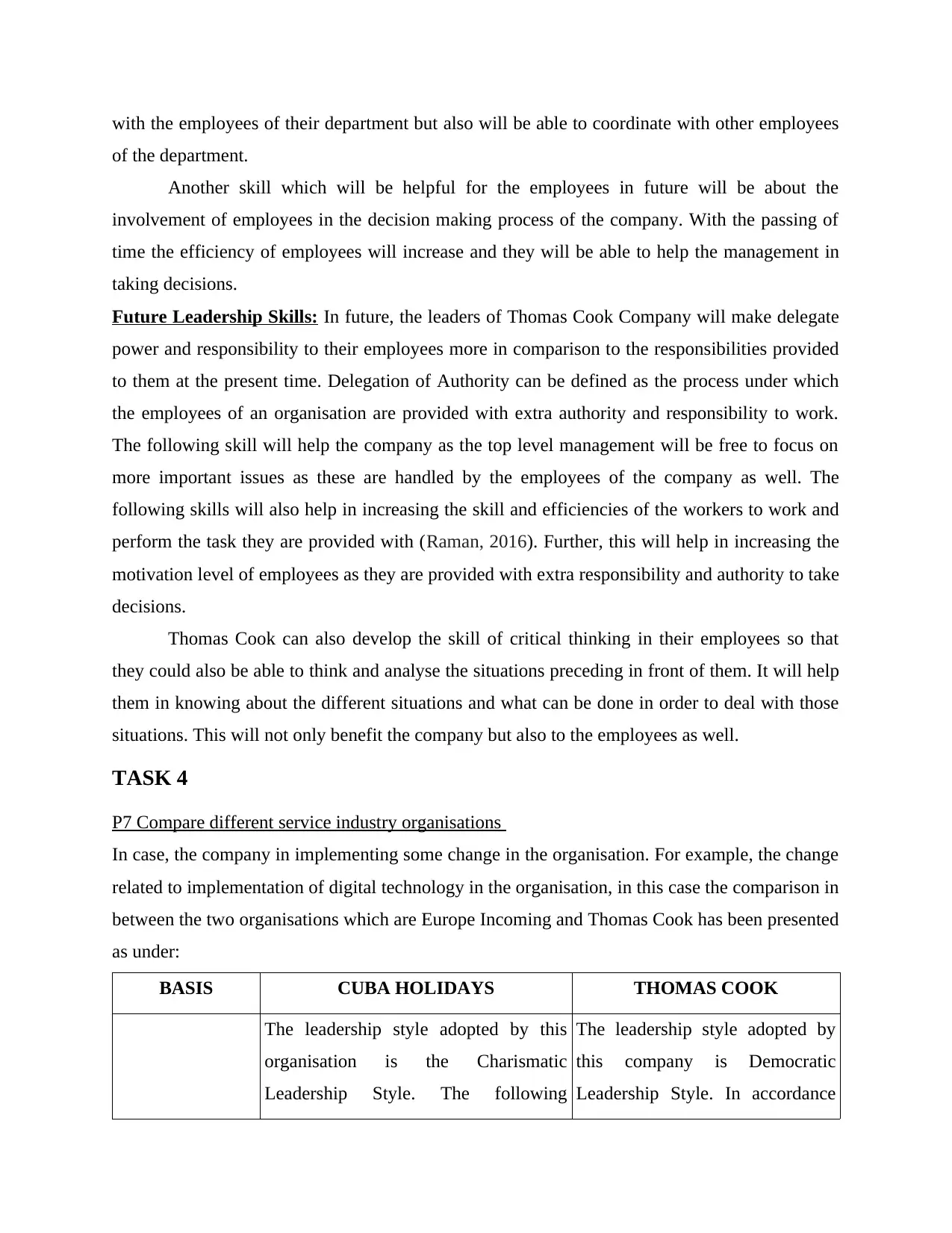
with the employees of their department but also will be able to coordinate with other employees
of the department.
Another skill which will be helpful for the employees in future will be about the
involvement of employees in the decision making process of the company. With the passing of
time the efficiency of employees will increase and they will be able to help the management in
taking decisions.
Future Leadership Skills: In future, the leaders of Thomas Cook Company will make delegate
power and responsibility to their employees more in comparison to the responsibilities provided
to them at the present time. Delegation of Authority can be defined as the process under which
the employees of an organisation are provided with extra authority and responsibility to work.
The following skill will help the company as the top level management will be free to focus on
more important issues as these are handled by the employees of the company as well. The
following skills will also help in increasing the skill and efficiencies of the workers to work and
perform the task they are provided with (Raman, 2016). Further, this will help in increasing the
motivation level of employees as they are provided with extra responsibility and authority to take
decisions.
Thomas Cook can also develop the skill of critical thinking in their employees so that
they could also be able to think and analyse the situations preceding in front of them. It will help
them in knowing about the different situations and what can be done in order to deal with those
situations. This will not only benefit the company but also to the employees as well.
TASK 4
P7 Compare different service industry organisations
In case, the company in implementing some change in the organisation. For example, the change
related to implementation of digital technology in the organisation, in this case the comparison in
between the two organisations which are Europe Incoming and Thomas Cook has been presented
as under:
BASIS CUBA HOLIDAYS THOMAS COOK
The leadership style adopted by this
organisation is the Charismatic
Leadership Style. The following
The leadership style adopted by
this company is Democratic
Leadership Style. In accordance
of the department.
Another skill which will be helpful for the employees in future will be about the
involvement of employees in the decision making process of the company. With the passing of
time the efficiency of employees will increase and they will be able to help the management in
taking decisions.
Future Leadership Skills: In future, the leaders of Thomas Cook Company will make delegate
power and responsibility to their employees more in comparison to the responsibilities provided
to them at the present time. Delegation of Authority can be defined as the process under which
the employees of an organisation are provided with extra authority and responsibility to work.
The following skill will help the company as the top level management will be free to focus on
more important issues as these are handled by the employees of the company as well. The
following skills will also help in increasing the skill and efficiencies of the workers to work and
perform the task they are provided with (Raman, 2016). Further, this will help in increasing the
motivation level of employees as they are provided with extra responsibility and authority to take
decisions.
Thomas Cook can also develop the skill of critical thinking in their employees so that
they could also be able to think and analyse the situations preceding in front of them. It will help
them in knowing about the different situations and what can be done in order to deal with those
situations. This will not only benefit the company but also to the employees as well.
TASK 4
P7 Compare different service industry organisations
In case, the company in implementing some change in the organisation. For example, the change
related to implementation of digital technology in the organisation, in this case the comparison in
between the two organisations which are Europe Incoming and Thomas Cook has been presented
as under:
BASIS CUBA HOLIDAYS THOMAS COOK
The leadership style adopted by this
organisation is the Charismatic
Leadership Style. The following
The leadership style adopted by
this company is Democratic
Leadership Style. In accordance
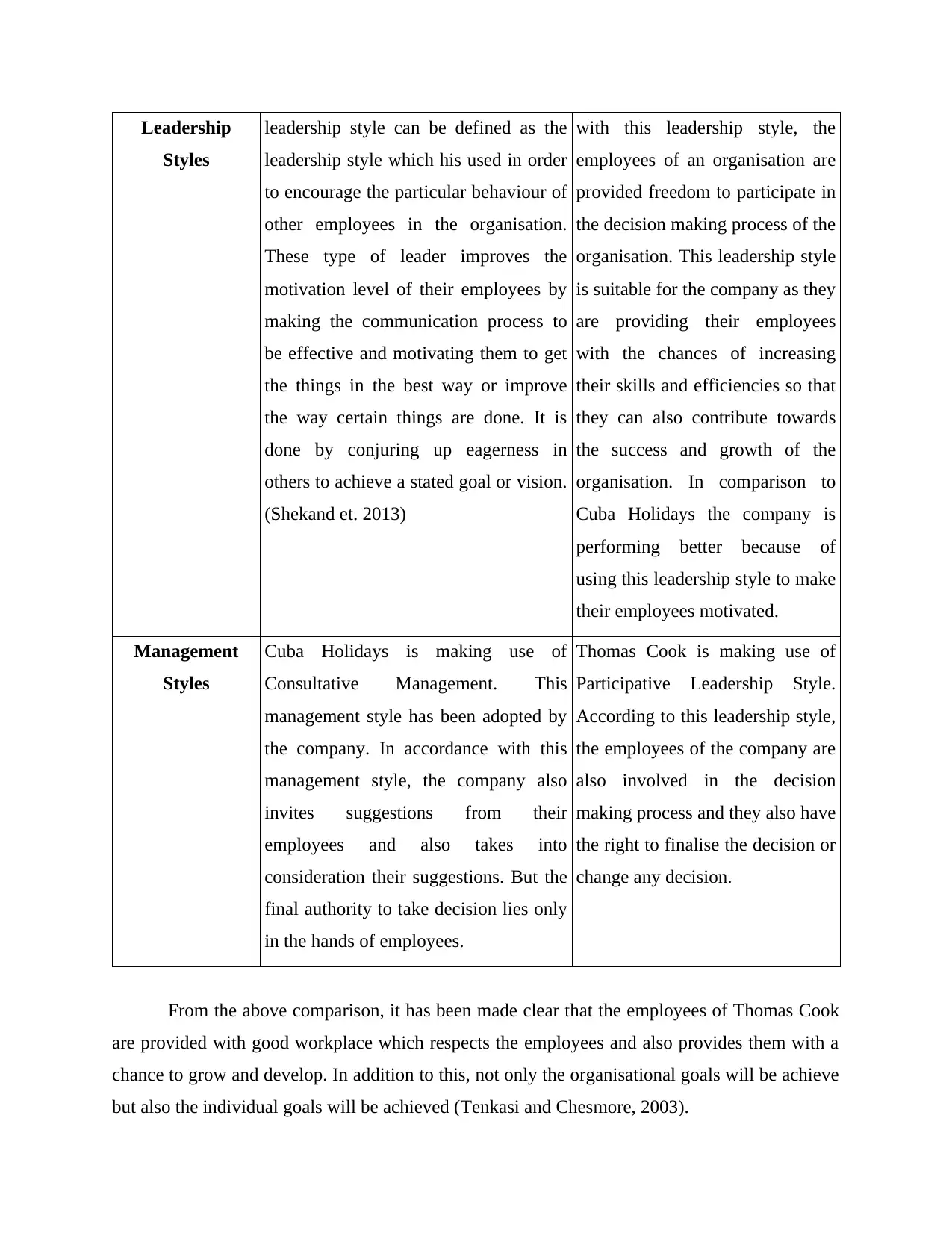
Leadership
Styles
leadership style can be defined as the
leadership style which his used in order
to encourage the particular behaviour of
other employees in the organisation.
These type of leader improves the
motivation level of their employees by
making the communication process to
be effective and motivating them to get
the things in the best way or improve
the way certain things are done. It is
done by conjuring up eagerness in
others to achieve a stated goal or vision.
(Shekand et. 2013)
with this leadership style, the
employees of an organisation are
provided freedom to participate in
the decision making process of the
organisation. This leadership style
is suitable for the company as they
are providing their employees
with the chances of increasing
their skills and efficiencies so that
they can also contribute towards
the success and growth of the
organisation. In comparison to
Cuba Holidays the company is
performing better because of
using this leadership style to make
their employees motivated.
Management
Styles
Cuba Holidays is making use of
Consultative Management. This
management style has been adopted by
the company. In accordance with this
management style, the company also
invites suggestions from their
employees and also takes into
consideration their suggestions. But the
final authority to take decision lies only
in the hands of employees.
Thomas Cook is making use of
Participative Leadership Style.
According to this leadership style,
the employees of the company are
also involved in the decision
making process and they also have
the right to finalise the decision or
change any decision.
From the above comparison, it has been made clear that the employees of Thomas Cook
are provided with good workplace which respects the employees and also provides them with a
chance to grow and develop. In addition to this, not only the organisational goals will be achieve
but also the individual goals will be achieved (Tenkasi and Chesmore, 2003).
Styles
leadership style can be defined as the
leadership style which his used in order
to encourage the particular behaviour of
other employees in the organisation.
These type of leader improves the
motivation level of their employees by
making the communication process to
be effective and motivating them to get
the things in the best way or improve
the way certain things are done. It is
done by conjuring up eagerness in
others to achieve a stated goal or vision.
(Shekand et. 2013)
with this leadership style, the
employees of an organisation are
provided freedom to participate in
the decision making process of the
organisation. This leadership style
is suitable for the company as they
are providing their employees
with the chances of increasing
their skills and efficiencies so that
they can also contribute towards
the success and growth of the
organisation. In comparison to
Cuba Holidays the company is
performing better because of
using this leadership style to make
their employees motivated.
Management
Styles
Cuba Holidays is making use of
Consultative Management. This
management style has been adopted by
the company. In accordance with this
management style, the company also
invites suggestions from their
employees and also takes into
consideration their suggestions. But the
final authority to take decision lies only
in the hands of employees.
Thomas Cook is making use of
Participative Leadership Style.
According to this leadership style,
the employees of the company are
also involved in the decision
making process and they also have
the right to finalise the decision or
change any decision.
From the above comparison, it has been made clear that the employees of Thomas Cook
are provided with good workplace which respects the employees and also provides them with a
chance to grow and develop. In addition to this, not only the organisational goals will be achieve
but also the individual goals will be achieved (Tenkasi and Chesmore, 2003).
⊘ This is a preview!⊘
Do you want full access?
Subscribe today to unlock all pages.

Trusted by 1+ million students worldwide
1 out of 14
Related Documents
Your All-in-One AI-Powered Toolkit for Academic Success.
+13062052269
info@desklib.com
Available 24*7 on WhatsApp / Email
![[object Object]](/_next/static/media/star-bottom.7253800d.svg)
Unlock your academic potential
Copyright © 2020–2026 A2Z Services. All Rights Reserved. Developed and managed by ZUCOL.




